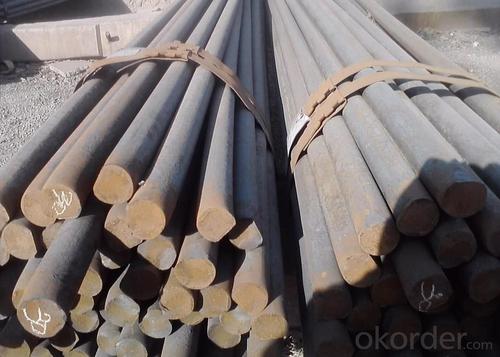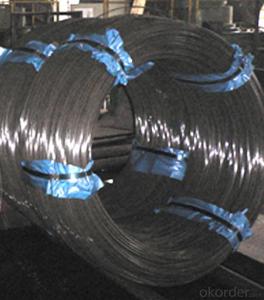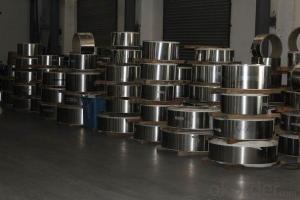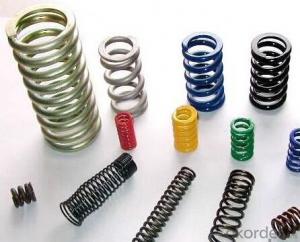HR Spring Steel
- Loading Port:
- China Main Port
- Payment Terms:
- TT or LC
- Min Order Qty:
- 50Tons m.t.
- Supply Capability:
- 600000TONS/YEAR m.t./month
OKorder Service Pledge
OKorder Financial Service
You Might Also Like
Spring Steel can be divided into two types. One is carbon spring steel, and other one is alloy spring steel.
Alloy spring steel is based on carbon spring steel, by adding one or more alloying elements to improve the mechanical properties, hardenability and other properties to meet the requirement for manufacturing all kinds of spring steel.
Specification of HR Spring Steel:
-Material: 65Mn
-Standard: GB
-Type: Spring Steel
Chemical Composition:
C | Si | Mn | S |
0.63~0.65 | 0.19~0.22 | 0.98~1.10 | ≤0.01 |
P | Cr | Ni | Cu |
≤0.014 | ≤0.2 | ≤0.02 | ≤0.05 |
Mechanical Properties:
-Tensile Strength σb (MPa): 825~925
-Yield Strength σs (MPa): 520~690
-Elongation δ10(%): 14~21.5
-Percentage reduction of area: ψ (%): ≥10
-Hardness:
1, Hot rolled: 240~270HB
2, Soft state hardness of cold rolled: 190~220HB
3, Hard state hardness of cold rolled: 300~340HB
4, Heat treatment: 38~60HRC
Usage/Applications of HR Spring Steel:
-65Mn, element Mn improves hardenability. Surface decarburizing tendency is less than silicon steel. After heat treatment, the mechanical properties are better than carbon steel.
-Spring steel of this material is usually used as flat and round spring of small size, clockwork spring, spring ring, valve spring, brake spring and so on.
Packaging & Delivery of HR Spring Steel:
-Packing Detail: The products can be packed in bundles by steel wires.
-Marks: We will paint both ends of each bundle of products to make sure that it’s more convenient for customers to distinguish their products from others, besides, we will tie tag marks to the bundles with following information: company name and logo, product name, specification, material, and so on.
-Delivery Detail:
1, Delivery time: 30~45 working days after receive buyer’s T.T. or L/C.
2, Delivery status should be written in the contract. (Heat treatment or no)
Transportation:
1, The products can be delivered by bulk vessel or by container. As for container, products with the length of 6m will be loaded in 20’ container, with 9m or 12m, in 40’ container.
2, The maximum quantity of loading of container is 25 tons.
3, The products are usually transported to the nearest port from the production place.
Photos of HR Spring Steel:
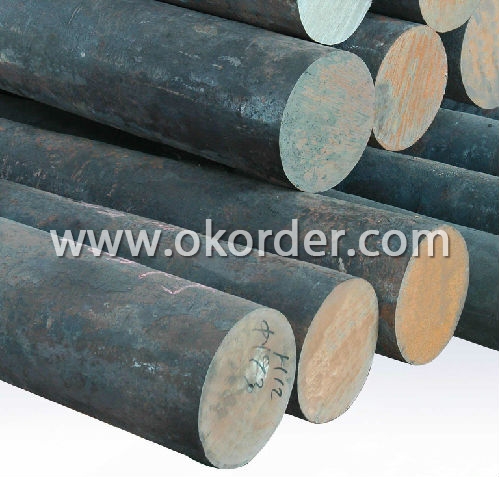
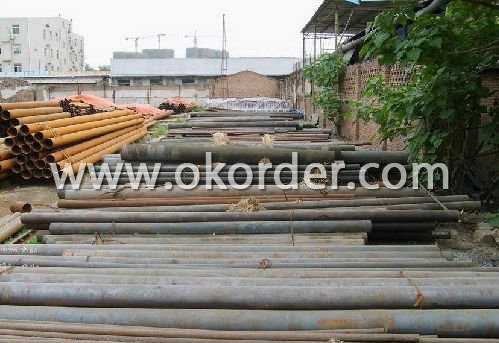
- Q: Does special steel require special machining techniques?
- Yes, special steel often requires special machining techniques due to its unique properties and characteristics. Special steels can have higher hardness, greater strength, improved corrosion resistance, or other desirable attributes that make them more challenging to machine compared to regular steels. Specialized cutting tools, machining parameters, and techniques may be necessary to achieve the desired precision, surface finish, and dimensional accuracy during the machining process.
- Q: Can special steel be used in the oil refinery industry?
- Yes, special steel can be used in the oil refinery industry. Special steel, such as stainless steel or high alloy steel, is often preferred in the oil refinery industry due to its superior corrosion resistance and high temperature strength. It is commonly used in various applications, including piping, tanks, heat exchangers, and valves, to ensure durability and reliability in the harsh and corrosive environment of oil refineries.
- Q: How is wear-resistant steel used in mining and earthmoving equipment?
- Wear-resistant steel is used in mining and earthmoving equipment to enhance their durability and longevity in harsh operating conditions. It is utilized to manufacture various components such as buckets, blades, cutting edges, and wear plates that are constantly subjected to abrasion, impact, and high stress. These steel parts ensure the equipment can withstand the abrasive nature of rocks, minerals, and other materials encountered during mining and earthmoving operations, reducing maintenance needs and increasing productivity.
- Q: How does special steel contribute to the energy equipment industry?
- The energy equipment industry heavily relies on special steel due to its crucial role in providing strength, durability, and resistance to extreme conditions. This industry encompasses various sectors, including oil and gas, renewable energy, power generation, and transmission. In the oil and gas sector, special steel is indispensable for constructing pipelines, drilling equipment, and storage tanks. Its unique properties, such as high tensile strength, corrosion resistance, and ability to withstand high pressure and temperature, make it an ideal material for these applications. Special steel ensures the safety and reliability of oil and gas operations by enduring harsh environments like corrosive substances and extreme weather conditions. The renewable energy sector also relies on special steel for manufacturing wind turbines, solar panels, and hydroelectric power systems. These energy sources require materials that are both strong and lightweight to withstand constant exposure to nature's elements. Special steel alloys, like high-strength low-alloy (HSLA) steel and stainless steel, are commonly used to construct the infrastructure of renewable energy systems, ensuring their longevity and efficiency. Moreover, special steel is essential for power generation and transmission equipment. It is utilized in the manufacturing of gas turbines, steam turbines, and generators. Special steel alloys can withstand the high temperatures and pressures generated during power generation processes, ensuring efficient and reliable energy production. Additionally, special steel is used in transmission infrastructure, including transmission towers and power cables, to support the efficient and safe transfer of electricity over long distances. Overall, special steel significantly contributes to the energy equipment industry by providing the necessary strength, durability, and resistance to extreme conditions. It enables the construction of reliable and efficient infrastructure, ensuring the smooth operation of energy systems in oil and gas, renewable energy, power generation, and transmission sectors.
- Q: How does special steel contribute to the manufacturing of industrial machinery?
- Special steel plays a crucial role in the manufacturing of industrial machinery by providing superior strength, durability, and resistance to extreme conditions. It allows for the construction of components that can withstand heavy loads, high temperatures, and corrosive environments, ensuring the reliability and longevity of the machinery. Additionally, special steel's unique properties enable the production of precise and intricate parts, enhancing the overall performance and efficiency of industrial machinery.
- Q: What are the properties of weathering steel?
- Weathering steel, also known as Corten steel, possesses several key properties. Firstly, it has a high resistance to corrosion, making it suitable for outdoor applications. Secondly, it forms a protective layer of rust on its surface, which not only adds to its aesthetic appeal but also acts as a barrier against further corrosion. Additionally, weathering steel is durable and strong, making it suitable for various structural applications. Lastly, it has the ability to withstand extreme weather conditions, including high temperatures and heavy rainfall, without deteriorating.
- Q: Can special steel be used in the production of consumer goods?
- Consumer goods can make use of special steel in their production. This type of steel is made up of alloys that have been specifically designed to possess distinct characteristics, such as exceptional strength, resistance to corrosion, or heat endurance. These traits enable special steel to be well-suited for a wide array of consumer goods that require longevity, robustness, or protection against wear and tear. One example of the utilization of special steel is in the manufacturing of kitchen appliances, like knives and cookware, where durability and resistance to corrosion are crucial. Additionally, consumer electronics, such as smartphones and laptops, can incorporate this steel in their casing or internal components to ensure structural integrity and safeguarding. Moreover, the automotive industry frequently relies on special steel for the creation of various consumer goods, including bicycles, motorcycles, and cars. The steel's combination of high strength and lightness makes it an ideal choice for constructing sturdy and enduring vehicle frames, engine parts, and other components. To summarize, the application of special steel in the production of consumer goods is indeed feasible due to its unique properties, which make it suitable for situations necessitating strength, durability, and protection against corrosion or wear.
- Q: How is magnetic alloy steel used in the production of magnetic components?
- Magnetic alloy steel is commonly used in the production of magnetic components due to its unique magnetic properties. It is an essential material for manufacturing products like magnetic cores, transformers, and inductors. The alloy's high saturation magnetization and low coercivity make it ideal for creating strong and efficient magnetic fields. Additionally, its excellent thermal stability ensures reliable performance under various operating conditions. Overall, magnetic alloy steel enhances the functionality and efficiency of magnetic components, making it a crucial material in their production.
- Q: What are the different types of bearing steel?
- There are several different types of bearing steel, including carbon steel, stainless steel, and chrome steel.
- Q: How does special steel contribute to reducing product waste during manufacturing?
- Special steel contributes to reducing product waste during manufacturing by offering superior strength, durability, and corrosion resistance. Its unique properties allow manufacturers to produce components that are longer-lasting and more resistant to wear and tear. This reduces the need for frequent replacements or repairs, ultimately minimizing product waste and increasing overall efficiency in the manufacturing process.
1. Manufacturer Overview
| Location | Jiangsu, China |
| Year Established | 2003 |
| Annual Output Value | Above US$ 30 Million |
| Main Markets | Asia-Pacific; Middle east |
| Company Certifications |
2. Manufacturer Certificates
| a) Certification Name | |
| Range | |
| Reference | |
| Validity Period |
3. Manufacturer Capability
| a) Trade Capacity | |
| Nearest Port | Shanghai. |
| Export Percentage | 20% - 30% |
| No.of Employees in Trade Department | 10-20 People |
| Language Spoken: | English; Chinese |
| b) Factory Information | |
| Factory Size: | Above 100,000 square meters |
| No. of Production Lines | 2 |
| Contract Manufacturing | OEM Service Offered; |
| Product Price Range | Average |
Send your message to us
HR Spring Steel
- Loading Port:
- China Main Port
- Payment Terms:
- TT or LC
- Min Order Qty:
- 50Tons m.t.
- Supply Capability:
- 600000TONS/YEAR m.t./month
OKorder Service Pledge
OKorder Financial Service
Similar products
Hot products
Hot Searches
Related keywords



